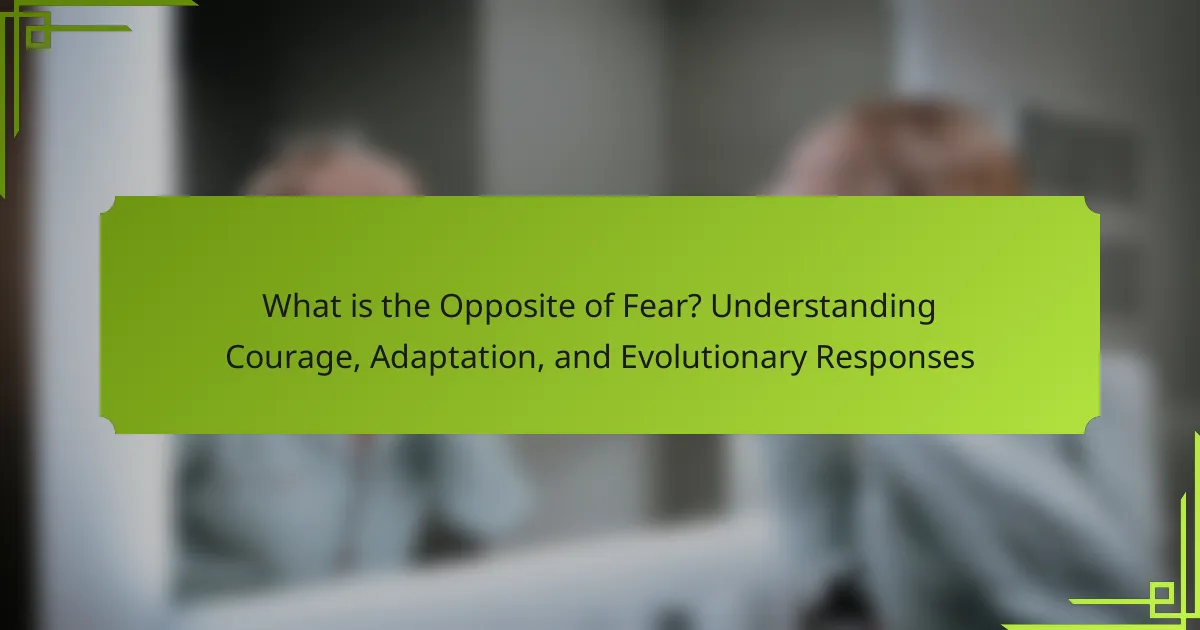Understanding courage is essential for personal growth and societal advancement. This article explores courage as the opposite of fear, its various forms, and its unique attributes. It examines how courage fosters resilience and proactive engagement in the face of challenges. Additionally, practical strategies for enhancing courage in daily life will be discussed.

What Defines Courage in Evolutionary Psychology?
Courage is the opposite of fear, representing an adaptive evolutionary response. It enables individuals to confront threats and challenges, enhancing survival and social cohesion. Courage fosters resilience, allowing for risk-taking and exploration, which are vital for adaptation. This unique attribute in evolutionary psychology highlights how courage can lead to personal growth and societal advancement.
How Does Courage Contrast with Fear?
Courage directly contrasts with fear by representing the ability to confront challenges despite feeling afraid. While fear triggers avoidance and withdrawal, courage promotes action and resilience. Courage is essential for personal growth and adaptation, enabling individuals to evolve beyond their fears.
What Role Does Adaptation Play in Courage?
Adaptation plays a crucial role in courage by enabling individuals to respond effectively to fear-inducing situations. This process involves adjusting behaviors and thoughts to overcome challenges, demonstrating resilience. As a result, adaptation fosters a mindset that embraces change, enhancing one’s ability to act courageously. This evolutionary response not only mitigates fear but also encourages growth and learning from experiences.
What are the Mechanisms of Adaptation?
Courage manifests through mechanisms of adaptation that enable individuals to confront fear. These mechanisms include physiological responses, psychological resilience, and behavioral strategies. Physiological responses involve the activation of the sympathetic nervous system, preparing the body for action. Psychological resilience allows individuals to reframe their perceptions of fear, fostering a growth mindset. Behavioral strategies encompass gradual exposure to fear-inducing situations, enhancing coping skills and confidence. Together, these mechanisms facilitate the evolutionary responses necessary for survival and personal growth.
How Does Adaptation Enhance Survival?
Adaptation enhances survival by enabling organisms to adjust to changing environments. This ability increases resilience against threats, such as climate shifts or food scarcity. For instance, species that adapt quickly can exploit new resources, leading to greater reproductive success. Evolutionary responses, driven by adaptation, result in unique traits that improve survival odds.

What Are the Universal Attributes of Courage?
Courage is the universal attribute that directly opposes fear. It embodies qualities such as bravery, resilience, and the ability to confront adversity. Courage manifests in various forms, including physical, moral, and emotional courage. Each type serves a unique purpose in adaptation and survival, reflecting evolutionary responses to threats.
How Does Courage Manifest Across Cultures?
Courage manifests differently across cultures, often reflecting unique values and social norms. In collectivist societies, courage may emphasize community welfare, while individualistic cultures often celebrate personal bravery. For instance, in many Asian cultures, courage may involve enduring hardship for family honour, whereas Western cultures might highlight the valor in standing up for personal beliefs. These variations illustrate how courage adapts to cultural contexts, shaping its expression and perceived significance. Understanding these differences enhances our appreciation of courage as a universal yet culturally nuanced concept.
What Psychological Benefits Are Associated with Courage?
Courage is associated with several psychological benefits, including increased resilience, improved mental health, and enhanced self-esteem. These benefits arise from facing and overcoming fears, which fosters a sense of accomplishment and empowerment. As a result, individuals often experience reduced anxiety and greater overall well-being. Courage also promotes adaptability, allowing people to navigate challenges more effectively and embrace change.

What Unique Attributes Distinguish Courage from Other Traits?
Courage is distinguished from other traits by its unique attribute of proactive engagement in the face of fear. Unlike traits such as resilience or determination, which may involve enduring challenges, courage specifically entails taking action despite the presence of fear. This proactive nature allows individuals to confront threats or challenges directly, leading to personal growth and adaptation. Additionally, courage often involves a moral or ethical dimension, making it a unique trait that encompasses both emotional and social aspects.
How Does Courage Influence Decision-Making?
Courage significantly enhances decision-making by enabling individuals to confront challenges and uncertainties. It fosters resilience, allowing for adaptive responses in complex situations. Courageous decisions often lead to innovative solutions and personal growth, as individuals are more willing to take risks and explore new opportunities. Ultimately, courage acts as a catalyst for effective decision-making, promoting a proactive rather than reactive approach.
What Are the Neurobiological Underpinnings of Courage?
Courage is the psychological and physiological response that counteracts fear. Neurobiological studies reveal that courage activates specific brain regions, including the prefrontal cortex and amygdala, which are involved in decision-making and emotional regulation.
Research indicates that courage is linked to adaptive evolutionary responses, enhancing survival by promoting risk-taking in uncertain environments. For instance, individuals exhibiting courageous behaviour often demonstrate heightened dopamine levels, which facilitate motivation and reward processing.
Unique attributes of courage include its capacity to foster resilience and enhance social bonding, contributing to group cohesion during crises. Understanding these neurobiological underpinnings can inform therapeutic approaches to anxiety and phobias, ultimately aiding individuals in overcoming fear.
In summary, courage is not merely the absence of fear but a complex interplay of neurobiological mechanisms that promote adaptation and evolutionary success.

What Rare Attributes Can Be Observed in Courageous Behavior?
Courageous behaviour exhibits rare attributes such as resilience, moral integrity, and selflessness. These traits distinguish individuals who act bravely despite fear. Resilience reflects the ability to recover from setbacks, while moral integrity involves standing up for one’s values. Selflessness showcases the willingness to prioritise others’ needs over personal safety. These attributes deepen the understanding of courage as a multifaceted response to fear.
What Are the Exceptional Cases of Courage in Human History?
Courage manifests in exceptional cases throughout human history, showcasing resilience against fear. Notable examples include the bravery of individuals during wartime, such as soldiers who defied overwhelming odds, and activists who confronted oppressive regimes, risking their lives for justice. These instances illustrate unique attributes of courage, emphasizing the human capacity for adaptation and moral conviction in dire circumstances. Such acts not only inspire but also reflect the evolutionary responses that have shaped societal values around bravery and sacrifice.
How Do Environmental Factors Shape Rare Acts of Courage?
Environmental factors significantly influence rare acts of courage by creating situations that demand adaptive responses. Factors such as social dynamics, environmental stressors, and cultural narratives can enhance or inhibit courageous behaviours. For example, extreme circumstances like natural disasters often reveal extraordinary acts of bravery, driven by survival instincts. These instances highlight the unique attribute of courage as a response to external pressures, showcasing how adaptation evolves in response to specific environmental contexts.

What Practical Strategies Can Enhance Courage in Daily Life?
To enhance courage in daily life, practice small, manageable challenges regularly. This builds resilience and confidence over time. Focus on positive self-talk, visualise success, and embrace discomfort as a growth opportunity. Seek supportive environments that encourage risk-taking and celebrate achievements, no matter how small.
What Techniques Can Help Overcome Fear?
Courage, adaptation, and evolutionary responses are key techniques to overcome fear. Embracing challenges fosters resilience. Practising exposure therapy gradually desensitises fear responses. Mindfulness techniques enhance awareness, allowing better emotional regulation. Social support provides encouragement, reinforcing positive behaviours.
How Can Individuals Cultivate Courageous Mindsets?
Cultivating a courageous mindset involves embracing discomfort and taking calculated risks. Individuals can develop this mindset by practising self-reflection, setting achievable goals, and seeking supportive environments. Engaging in challenging situations fosters adaptation and resilience, essential components of courage. Regularly confronting fears can lead to personal evolution and greater self-confidence.
What Common Mistakes Should Be Avoided in Pursuing Courage?
To pursue courage effectively, avoid common mistakes like overthinking, which can paralyse decision-making. Embrace vulnerability; hiding emotions can hinder growth. Resist the urge to conform; true courage often requires standing alone. Lastly, don’t overlook small acts of bravery; they build resilience over time.
What Expert Insights Can Guide the Development of Courage?
Courage can be developed through practice, exposure, and supportive environments. Expert insights emphasise gradual challenges to build resilience. Techniques such as mindfulness and cognitive reframing enhance adaptability. Research shows that social support significantly influences courage development. Emphasising growth mindsets fosters long-term evolution in courageous behaviour.
